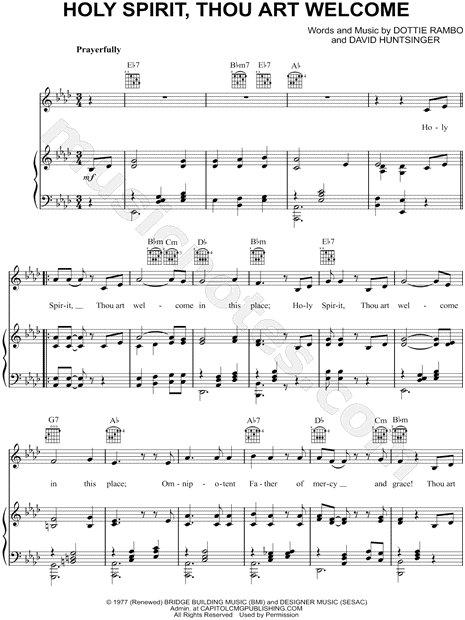Have you ever felt a deep, inner longing for something more, a sense that something profound is missing in your life? Perhaps you’ve been drawn to spiritual experiences, yearning for a connection with something greater than yourself. This very longing, this yearning for something beyond the mundane, is the very spark of the Holy Spirit’s presence in our hearts. It’s a whisper calling us deeper, inviting us into a relationship that transcends the ordinary. Just as the hymn “Holy Spirit, Thou Art Welcome” beautifully articulates, we’re meant to open our hearts and invite the Holy Spirit to fill us, transforming our lives from the inside out.

Image: www.musicnotes.com
This hymn, a beloved staple in Christian tradition, speaks not only to the yearning in our hearts but also to the power and presence of the Holy Spirit within us. It’s a hymn of invitation, a call to welcome the Holy Spirit into our individual lives, our communities, and our world. It’s a celebration of the Spirit’s power to heal, inspire, and empower us to live lives of purpose and love. In this article, we’ll delve into the depth of this powerful hymn, exploring its lyrics, its history, and its profound message for each of us.
Unpacking the Lyrics: A Hymn of Welcome and Transformation
The lyrics of “Holy Spirit, Thou Art Welcome,” also known as “Come, Holy Spirit, Heavenly Dove,” are simple yet profound. Each verse speaks to a different aspect of the Holy Spirit’s presence and invites us to actively engage with it:
Verse 1:
- “Come, Holy Spirit, Heavenly Dove,
With all Thy quickening powers,
Kindle a flame of sacred love,
In these cold hearts of ours.”
This verse is a direct invitation to the Holy Spirit, acknowledging its spiritual power and calling for its transformative presence in our lives. The image of the “Heavenly Dove” is symbolic of the Holy Spirit’s peace, gentleness, and guiding presence. We’re asked to embrace the Holy Spirit’s “quickening powers,” which refers to its ability to ignite within us a love for God and for others.
Verse 2:
- “Come, Holy Spirit, Heavenly Dove,
With all Thy quickening powers,
Kindle a flame of sacred love,
In these cold hearts of ours.”
The repetition of the first verse emphasizes the urgency of our invitation. It’s a plea for the Holy Spirit’s presence in our hearts, to break through the “coldness” and ignite the flame of love.
Verse 3:
- “Come, Holy Comforter, divine,
And teach us what to do;
Unveil to us the things unseen,
And help us to be true.”
Here, the Holy Spirit is invoked as the “Holy Comforter,” a source of peace and solace. It asks for guidance, the revelation of truth, and the strength to live authentically.
Verse 4:
- “Come, Holy Spirit, Heavenly Dove,
With all Thy quickening powers,
Kindle a flame of sacred love,
In these cold hearts of ours.”
The repetition of the first verse reinforces the central theme of the hymn: the yearning for the Holy Spirit’s presence and the transformation it brings.
The History of “Holy Spirit, Thou Art Welcome”
The hymn “Holy Spirit, Thou Art Welcome” is a translation of a Latin hymn known as “Veni Sancte Spiritus,” which dates back to the 11th century. The original Latin text is attributed to a Benedictine monk named Stephen Langton. It was widely used in the Catholic Church and eventually found its way into Protestant hymnals.
The hymn’s enduring popularity over centuries speaks to its timeless message. It’s a hymn of universal appeal, embodying the human longing for connection and the transformative power of the Holy Spirit.
Understanding the Holy Spirit: The Third Person of the Trinity
The Holy Spirit, often referred to as the Comforter or Advocate, is the third person of the Christian Trinity, alongside God the Father and God the Son (Jesus Christ). The Holy Spirit is not simply a force or an ethereal entity; it is a person, a member of the Godhead who is fully God and equal with the Father and the Son.
The Holy Spirit is portrayed in different ways throughout scripture, often depicted as a dove, wind, or fire. These images illustrate the Holy Spirit’s power, presence, and the way it moves among us.

Image: www.musixmatch.com
The Holy Spirit’s Role in Our Lives
The Holy Spirit plays a crucial role in the Christian faith, empowering believers and guiding them in their relationship with God. Here are some of the key roles of the Holy Spirit:
- Conviction and Regeneration: The Holy Spirit helps us understand our need for God’s forgiveness, leading to repentance and a new life through Jesus Christ.
- Guidance and Empowerment: The Holy Spirit guides us in our daily lives, revealing God’s will and empowering us to live out our faith.
- Gifts and Fruit: The Holy Spirit bestows spiritual gifts upon believers, such as wisdom, knowledge, prophecy, healing, and faith. These gifts are given to build up the church and serve others. Furthermore, the Holy Spirit produces spiritual fruit in our lives: love, joy, peace, patience, kindness, goodness, faithfulness, gentleness, and self-control.
- Intercession: The Holy Spirit intercedes for us, pleading with God on our behalf when we don’t know how to pray.
- Unity and Love: The Holy Spirit unites believers in love and fellowship, creating a sense of belonging and purpose within the church.
The Significance of “Holy Spirit, Thou Art Welcome”
The hymn “Holy Spirit, Thou Art Welcome” is deeply significant for its message of active invitation and transformation. By singing this hymn, we acknowledge that the Holy Spirit’s presence is not something to be passively awaited, but rather something to be actively welcomed and sought after. It’s a call to open our hearts and minds to the Spirit’s influence, allowing it to work in us and through us.
Practical Applications for Your Life
So, how can we practically apply the message of this hymn to our own lives? Here are some suggestions:
- Pray for the Holy Spirit’s presence: Make it a habit to pray, asking the Holy Spirit to fill you, guide you, and empower you.
- Read the Bible and reflect on its message: The Bible is God’s Word, and the Holy Spirit guides us as we read and understand it.
- Seek out opportunities to serve others: The Holy Spirit works through us as we love and serve others, putting our faith into action.
- Join a community of believers: Surround yourself with others who are on a similar journey of faith, to grow together and support one another.
Lyrics Holy Spirit Thou Art Welcome
Conclusion
“Holy Spirit, Thou Art Welcome” is more than just a hymn; it’s an invitation to a transformative relationship with the Holy Spirit. By embracing its message and actively inviting the Holy Spirit’s presence, we can experience the fullness of God’s love and power in our lives. As we sing the words of this hymn, we’re not merely uttering a prayer; we’re opening our hearts to a profound and life-changing encounter. Let’s continue to sing this hymn with conviction and joy, welcoming the Holy Spirit into our hearts and letting its grace transform us.
Take the next step! Explore the rich history and theology of the Holy Spirit further. There are countless resources available to deepen your understanding of its power and role in our lives. Share your experiences with this hymn and its impact on your faith journey in the comments below!






